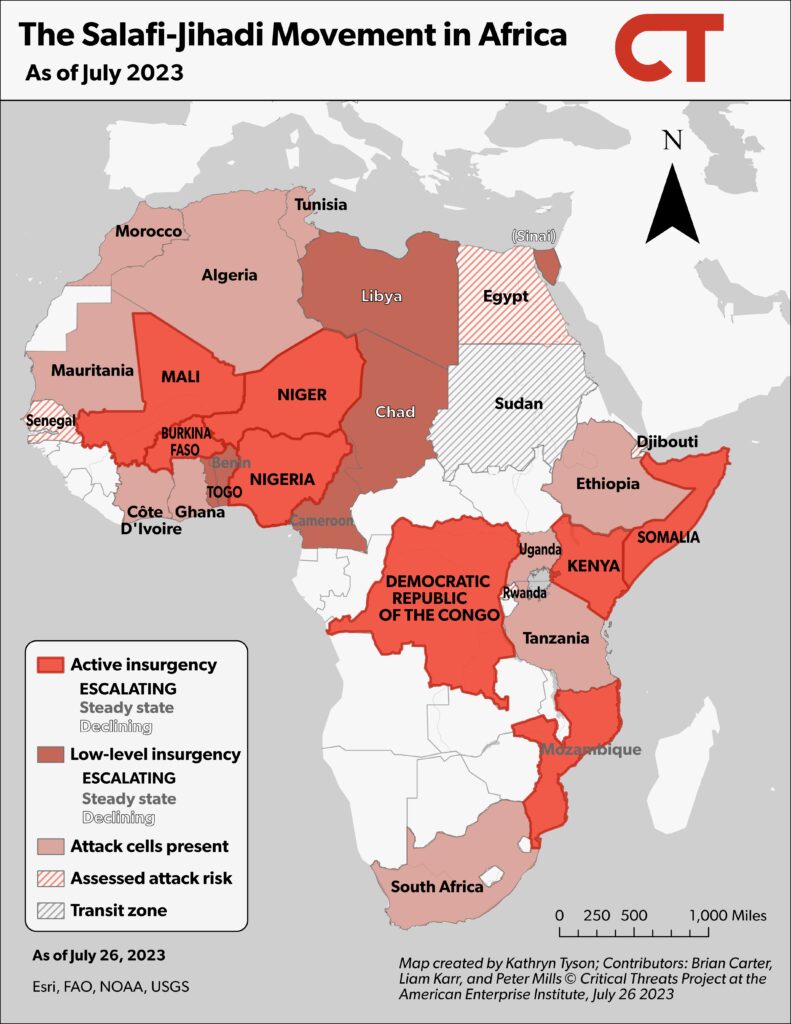The outcome of the attempted coup in Niger on July 26 is unclear. The Nigerien presidential guards besieged the presidential palace and surrounding ministries in Niamey on July 26, sealing President Mohamed Bazoum inside the palace and forcing negotiations.[1] Jeune Afrique reported that President Bazoum had been considering sacking the presidential guards’ head in the days before the attempted coup.[2]
The presidential guards lack broader support, however. Other Nigerien defense and security forces did not join the presidential guards. The presidential Twitter account and independent journalists say that President Bazoum is safe inside the palace and that the Nigerien Armed Forces and national guard have remained loyal to the president and are prepared to retake the palace.[3] Loyalist forces have also seized the area near the national broadcasting station to prevent coup forces from taking the building.[4] Pro-Bazoum protests in Niamey also indicate the coup plotters lack popular support.[5]
Coups elsewhere in the Sahel have strengthened the regional al Qaeda and Islamic State affiliates. Both the al Qaeda and Islamic State affiliates in the Sahel have strengthened significantly since coups in Mali in 2021 and Burkina Faso in 2022 caused a decrease in international security assistance.[6] The coups in the Sahel accelerate the Salafi-jihadi insurgency’s spread by distracting security forces with maintaining military juntas, alienating international partners, and abusing civilians.[7] The fallout from the coups led to the withdrawal of significant French contingents from both countries and has led the UN to end its decade-long peacekeeping mission in Mali by the end of 2023.[8]
A successful coup in Niger would likely further strengthen al Qaeda and the Islamic State by preoccupying Nigerien security forces and hindering international security cooperation. Niger is the last remaining Western partner in the tri-border area of Burkina Faso, Mali, and Niger after the coups in Burkina Faso and Mali.[9] Several countries, including France and the US, have soldiers stationed in Niger or are planning to withdraw their troops from Mali to Niger after the end of the UN mission.[10] These Western forces work alongside Nigerien troops to degrade Salafi-jihadi sanctuaries along Niger’s borders.[11]
Niger is also the largest recipient of US State Department military assistance in West Africa and the second highest in sub-Saharan Africa.[12] US law mandates that the government must stop all foreign aid except democratic assistance to countries where the military overthrows a democratically elected government, although a new waiver gives the secretary of state and federal agencies a process to waive the restriction if it is in the US national security interest.[13]
Russia could exploit a new junta government to evade Western sanctions. Russian information operations have boosted popular anti-Western and pro-Russian sentiment in Niger, like many other countries across the Sahel.[14] Russia capitalized on this sentiment and the anti-Western junta in Mali to secure a deal to deploy the Wagner Group in 2021, and it has explored deals with the Burkinabe junta since at least 2022.[15] President Bazoum planning to sack the presidential guards’ commander before the coup—and reports that Bazoum’s predecessor who appointed the commander is mediating negotiations—indicates that the coup is more related to internal power-sharing disputes than counterterrorism issues or geopolitical preferences.[16]
The coup plotters could still use anti-Western sentiment to rally a popular support base, given the coup’s lack of support among the armed forces, and an internationally isolated government is more likely to turn to Russia for security assistance. Niger has significant uranium deposits that would aid Russia’s sanctions-evasion efforts.[17] However, the fallout of the Wagner Group’s rebellion in Russia in June will limit Russia’s capacity to take advantage of the coup, due to Wagner’s outsized role in Russian assistance in Africa.[18]
An unsuccessful coup will still create limited opportunities for Salafi-jihadi insurgents while security forces are preoccupied. Security forces rotating to eastern Niger for Nigerien Independence Day on August 3 returned to Niamey to help thwart the coup attempt, which will decrease pressure on the Islamic State affiliate that operates in the Lake Chad Basin.[19] Security forces in western Niger have also presumably moved toward the capital to stop the coup. Al Qaeda’s regional associate evicted several villages in southwestern Niger in July, and the resulting decrease in counterterrorism pressure could allow them to consolidate a foothold in this area.[20]
Figure 1. The Salafi-Jihadi Movement in Africa

